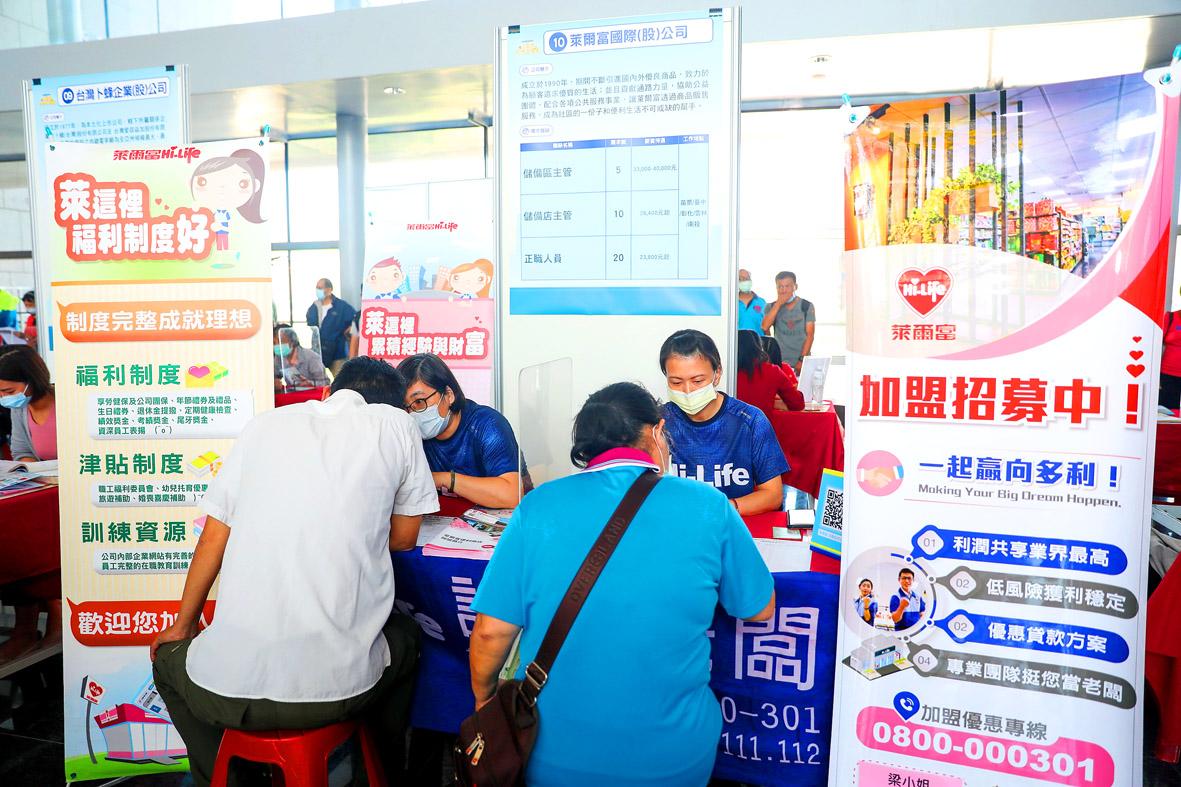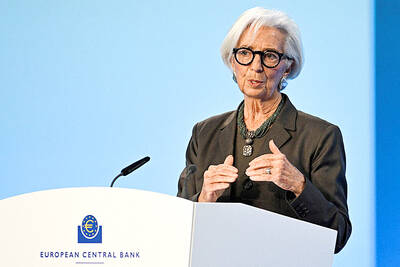The nation’s unemployment rate last month dropped to 3.8 percent, falling for the sixth consecutive month, as fewer people quit their jobs, although more people became unemployed due to business downsizing or closures, the Directorate-General of Budget, Accounting and Statistics (DGBAS) said yesterday.
The data represented a fractional 0.03 percentage point retreat from one month earlier as the effects of the COVID-19 pandemic continued to subside, but has not disappeared altogether, the statistics agency said.
“The job market is quite stable, even though it has not fully recovered to the pre-pandemic level,” DGBAS Deputy Director Chen Hui-hsin (陳惠欣) said.

Photo: Tsai Shu-yuan, Taipei Times
The reading after seasonal adjustments stood at 3.77 percent, also lower than 3.78 percent one month earlier, affirming a slow, but steady improvement, the agency’s monthly report showed.
The hospitality sector has mostly come out of the woods judging by their staffing size from a year earlier, while construction and real-estate sectors appeared unharmed, Chen said.
The working population grew by 48,000 since the government lifted major social distancing requirements in June, allowing people to gather, shop and travel domestically, she said.
The number of unemployed people fell to 455,000, shrinking 0.66 percent from one month earlier, as the number of people who quit decreased by 3,000, the agency said, adding that the number of first-time jobseekers and people who lost seasonal jobs both fell by 1,000.
However, the number of people who lost their jobs due to business downsizing and closures gained 2,000, it said.
The average period of unemployment was 22.9 weeks, longer than 20.9 weeks one month earlier, with first-time jobseekers taking 23.5 weeks to land a position, the report found.
The number of people who had been unemployed for longer than a year dropped by 2,000 to 51,000, it said.
A breakdown of the figures by education level showed that university graduates had the highest unemployment rate at 5.57 percent, followed by high-school graduates at 3.42 percent and graduate degree holders at 2.94 percent, the report showed.
People with junior-high school education had the lowest unemployment rate at 2.66 percent.
People aged 20 to 24 had the highest unemployment rate at 12.39 percent, followed by those aged 15 to 19 at 8.77 percent, 25 to 29 at 6.42 percent, and 30 to 34 at 3.61 percent, it said.
The unemployment rate was lowest for people aged 45 to 64 at 2.25 percent.
Taiwan’s unemployment rate was higher than South Korea’s 3.7 percent and Japan’s 3 percent, but lower than Hong Kong’s 6.6 percent, the report said.

European Central Bank (ECB) President Christine Lagarde is expected to step down from her role before her eight-year term ends in October next year, the Financial Times reported. Lagarde wants to leave before the French presidential election in April next year, which would allow French President Emmanuel Macron and German Chancellor Friedrich Merz to find her replacement together, the report said, citing an unidentified person familiar with her thoughts on the matter. It is not clear yet when she might exit, the report said. “President Lagarde is totally focused on her mission and has not taken any decision regarding the end of

French President Emmanuel Macron told a global artificial intelligence (AI) summit in India yesterday he was determined to ensure safe oversight of the fast-evolving technology. The EU has led the way for global regulation with its Artificial Intelligence Act, which was adopted in 2024 and is coming into force in phases. “We are determined to continue to shape the rules of the game... with our allies such as India,” Macron said in New Delhi. “Europe is not blindly focused on regulation — Europe is a space for innovation and investment, but it is a safe space.” The AI Impact Summit is the fourth

CONFUSION: Taiwan, Japan and other big exporters are cautiously monitoring the situation, while analysts said more Trump responses ate likely after his loss in court US trading partners in Asia started weighing fresh uncertainties yesterday after President Donald Trump vowed to impose a new tariff on imports, hours after the Supreme Court struck down many of the sweeping levies he used to launch a global trade war. The court’s ruling invalidated a number of tariffs that the Trump administration had imposed on Asian export powerhouses from China and South Korea to Japan and Taiwan, the world’s largest chip maker and a key player in tech supply chains. Within hours, Trump said he would impose a new 10 percent duty on US imports from all countries starting on

STRATEGIC ALLIANCE: The initiative is aimed at protecting semiconductor supply chain resilience to reduce dependence on China-dominated manufacturing hubs India yesterday joined a US-led initiative to strengthen technology cooperation among strategic allies in a move that underscores the nations’ warming ties after a brief strain over New Delhi’s unabated purchase of discounted Russian oil. The decision aligns India closely with Washington’s efforts to build secure supply chains for semiconductors, advanced manufacturing and critical technologies at a time when geopolitical competition with China is intensifying. It also signals a reset in relations following friction over energy trade and tariffs. Nations that have joined the Pax Silica framework include Japan, South Korea, the UK and Israel. “Pax Silica will be a group of nations